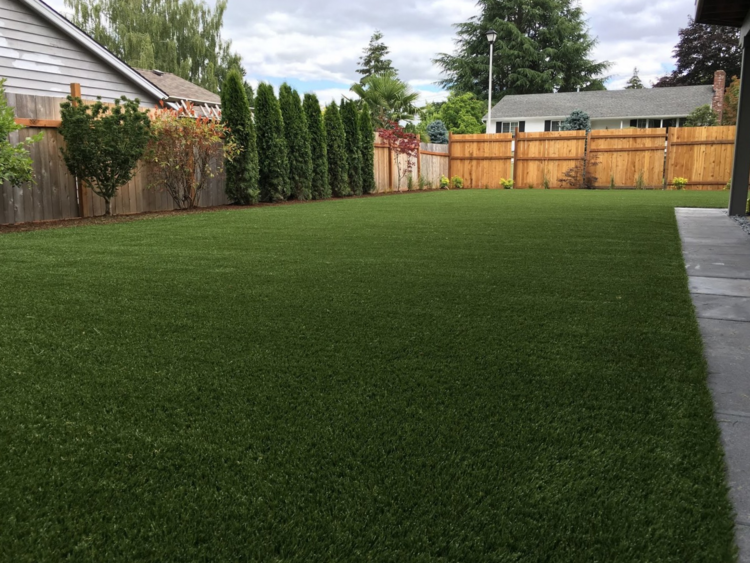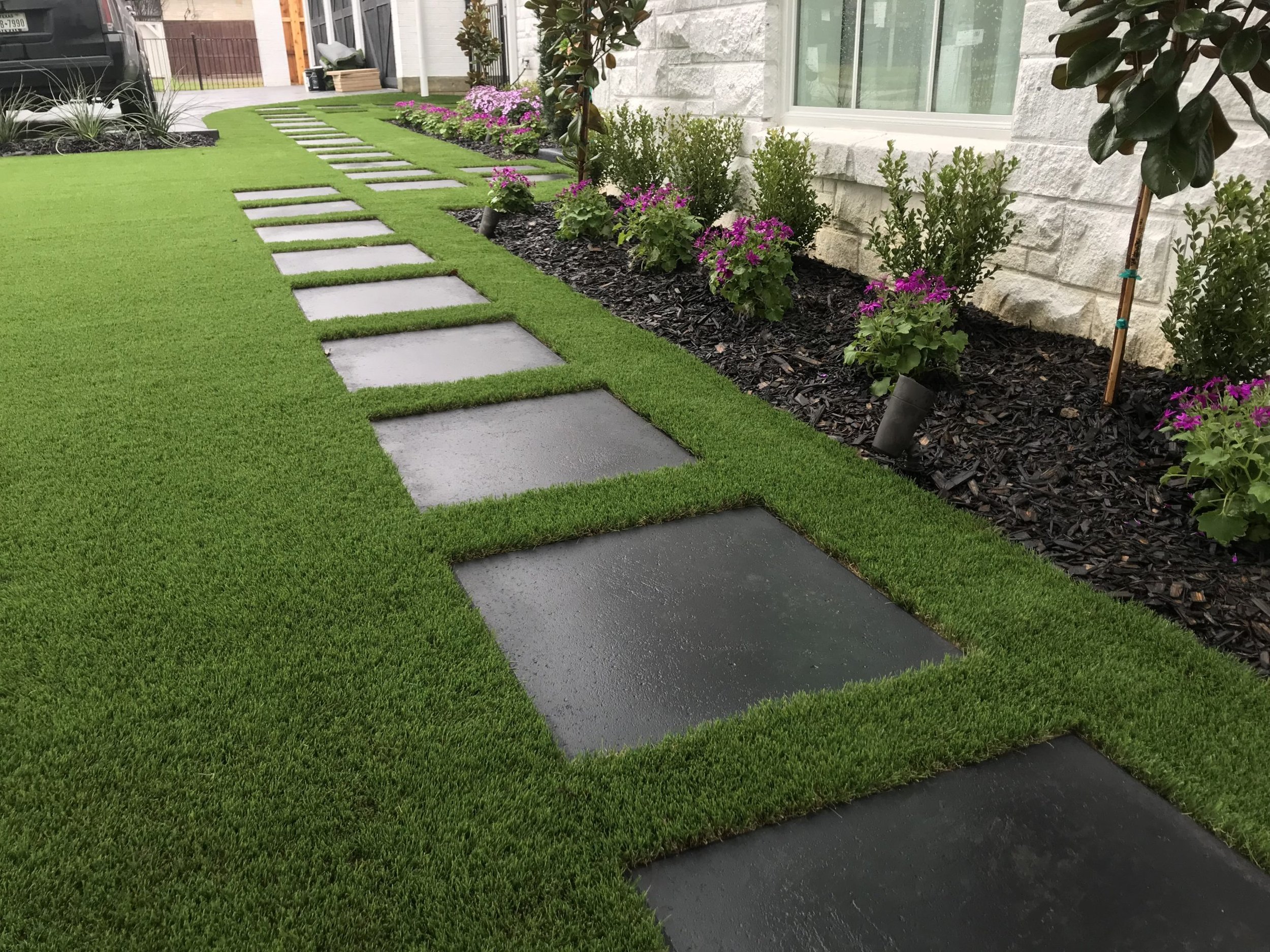See Why Homeowners Prefer Synthetic Grass for Sustainable Landscape Design Practices
As homeowners increasingly focus on sustainability in landscape design, fabricated lawn has actually emerged as a compelling alternative to traditional grass. Its ability to preserve water, minimize upkeep efforts, and minimize environmental influence placements it as a functional option for those seeking environment-friendly options. Additionally, the aesthetic allure and adaptability of synthetic grass satisfy varied style preferences. The effects of this shift extend past mere comfort and aesthetic appeals, triggering a closer exam of exactly how these choices influence more comprehensive environmental end results. What stays to be discovered is the complete range of benefits that synthetic grass can use to homeowners and the atmosphere alike.
Water Preservation Advantages
Among one of the most substantial advantages of synthetic grass is its duty in water preservation. Conventional grass lawns need considerable quantities of water to keep their lush appearance, typically bring about overuse of neighborhood water resources, especially in arid regions. On the other hand, synthetic grass removes this need totally, as it does not need watering. This not only saves water yet likewise minimizes the pressure on metropolitan water supply, especially during dry spell problems.
Furthermore, the installation of synthetic grass can add to a much more sustainable landscape. Homeowners can considerably lower their water costs, permitting reallocation of sources to various other environmental initiatives or house usages. Furthermore, synthetic grass is designed to withstand numerous weather conditions without the need for supplementary watering, making it an excellent selection for regions facing water deficiency.
The ecological benefits expand past immediate water savings. By lowering water usage, artificial lawn assists to mitigate the influences of climate change, maintaining important communities that are threatened by too much water extraction. As sustainable landscape design methods acquire grip, man-made grass emerges as a liable option for home owners looking for to create environmentally friendly outdoor areas.
Decreased Upkeep Initiatives
Synthetic grass substantially decreases upkeep efforts contrasted to conventional grass yards. With fabricated yard, house owners can remove the time-consuming jobs related to natural landscape design, such as mowing, fertilizing, and weeding. This not just conserves valuable time however also minimizes physical labor, making lawn care easily accessible for individuals of any ages.
Among one of the most notable advantages is the lack of normal mowing. Traditional yards call for constant trimming to maintain a visually pleasing elevation, whereas fabricated turf remains consistently lush without the need for cutting. Additionally, homeowners no much longer require to apply chemicals or fertilizers, which are frequently called for to maintain all-natural grass healthy. This shift not only lightens the work but also promotes a neater, much more uniform appearance year-round.
In addition, synthetic grass is durable and resilient, calling for very little upkeep past periodic brushing and rinsing to get rid of particles. This simplicity of maintenance permits house owners to enjoy their exterior areas without the continuous worry of maintenance, giving more time for leisure and family members activities. Ultimately, the lowered maintenance initiatives connected with synthetic grass make it an attractive option for those looking for a low-maintenance, visually appealing landscape.

Ecological Influence Decrease
There is an expanding recognition of the environmental benefits connected with man-made lawn, specifically in regards to water preservation and reduced chemical usage. Standard yards need substantial amounts of water, particularly in drought-prone regions, causing boosted stress on regional water resources. On the other hand, man-made grass gets rid of the requirement for irrigation, dramatically minimizing water usage and promoting sustainability.
Furthermore, conventional lawn upkeep often entails the application of chemicals, herbicides, and fertilizers, which can contribute to soil and water air pollution. Synthetic grass alleviates this environmental hazard by calling for very little upkeep and virtually removing the requirement for damaging chemicals. This not only boosts dirt health but additionally secures local ecosystems from poisonous overflow.
Moreover, the manufacturing of natural grass yards check out this site generally involves the usage of nonrenewable fuel sources for cutting and landscaping tools, additional adding to greenhouse gas discharges. By choosing synthetic grass, home owners can substantially lower their carbon impact associated with grass care tasks.
Aesthetic Charm and Versatility
Along with its ecological benefits, artificial grass uses significant aesthetic charm and convenience for landscape design. Property owners can accomplish a lavish, environment-friendly appearance year-round, eliminating the seasonal changes generally related to natural lawn. This regular visual not only improves the aesthetic allure of a residential or commercial property however additionally adds to a polished and well-kept appearance.
Moreover, synthetic grass is available in a range of appearances, designs, and shades, enabling for modification to match private preferences and style themes - Phoenix turf companies. Whether utilized in domestic gardens, commercial rooms, or entertainment locations, it can effortlessly incorporate right into varied landscape design layouts, from modern minimalist to lush exotic setups
The adaptability of synthetic grass prolongs past simple appearance; it can be mounted in different locations, consisting of roofs, outdoor patios, and also indoor spaces, developing chances for distinct landscaping remedies. Furthermore, it appropriates for an array of activities, from children's backyard to pet-friendly atmospheres, providing capability without jeopardizing design.
Eventually, the aesthetic allure and flexibility of synthetic grass make it an appealing alternative for house owners seeking lasting landscaping options that do not sacrifice appeal for environmental duty.

Long-Term Cost Cost Savings
One of the most compelling advantages of synthetic grass is its capacity for long-lasting expense savings. Unlike natural turf, which requires regular maintenance-- including mowing, watering, feeding, and parasite control-- synthetic grass significantly reduces these ongoing expenditures. Home owners can conserve a significant quantity on water expenses, particularly in regions where water scarcity is a pushing concern. The removal of yard care services further adds to economic savings, as there is no need for specialized tools or labor.
Additionally, synthetic grass has a life expectancy of 15 to 25 years, depending on its top quality and usage. This resilience decreases replacement prices, making it a much more economical option in the long run. In addition, the preliminary financial investment in synthetic grass can commonly be recovered via the cost savings built up gradually.
While the ahead of time expense might seem greater contrasted to sod installment, the advancing financial savings from reduced upkeep and water use typically outweigh these initial expenses. Inevitably, the adoption of synthetic grass not only advertises a lasting landscaping service yet also provides house owners a financially smart choice that straightens with long-term budgeting goals.
Final Thought
Synthetic turf arises as an engaging option for sustainable landscape check here design, supplying considerable web link advantages in water conservation, lowered maintenance efforts, and lessened ecological effect. As communities significantly focus on environmentally pleasant practices, the fostering of man-made turf stands for a progressive action towards accomplishing resistant and sustainable landscapes.
Furthermore, artificial turf is developed to hold up against various climatic conditions without the need for supplemental watering, making it an ideal selection for regions encountering water deficiency. (Arizona turf)

Fabricated grass arises as a compelling alternative for sustainable landscape design, supplying considerable advantages in water preservation, decreased upkeep efforts, and diminished ecological effect.